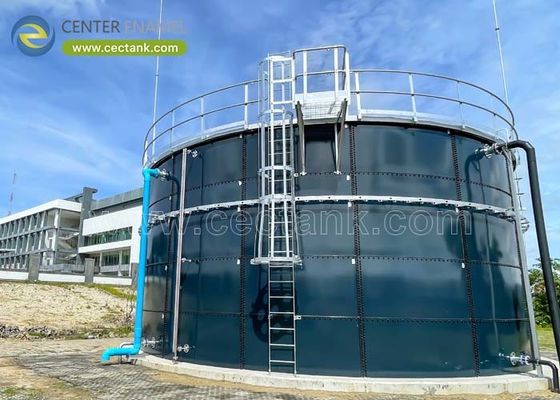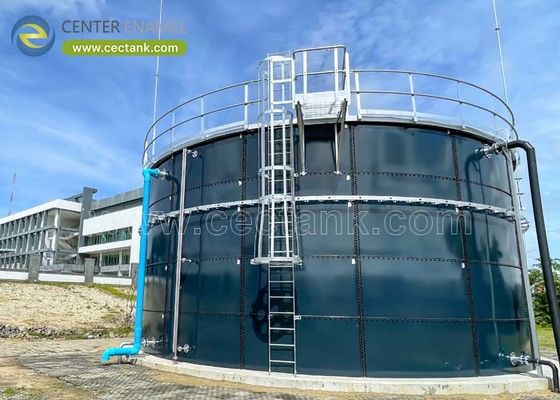-
Glass Fused To Steel Tanks (419)
-
Stainless Steel Tanks (421)
-
Fusion Bonded Epoxy Tanks (424)
-
Galvanized Steel Tanks (321)
-
Aluminum Dome Roofs (947)
-
Wastewater Storage Tanks (226)
-
Welded Steel Tanks (297)
-
Pressure Vessels (295)
-
Anaerobic Digester (201)
-
Industrial Water Tanks (349)
-
Glass Lined Steel Tanks (180)
-
Bolted Steel Tanks (181)
-
Sludge Storage Tank (115)
-
Biogas Storage Tank (173)
-
Leachate Storage Tanks (133)
-
Agricultural Water Storage Tanks (179)
-
Fire Water Tank (166)
-
Grain Storage Silos (130)
-
Biogas Projects (349)
-
Wastewater Treatment Projects (270)
-
Double Membrane Roof (223)
Why Choose Bolted Steel Tanks for Water Storage Over Welded Steel Tanks?
| Place of Origin: | CHINA |
| Brand Name: | CEC TANKS |
| Certification: | ISO 9001:2008, AWWA D103 , OSHA , BSCI |
| Model Number: | W20180508003 |
| Minimum Order Quantity: | 1 SET |
| Price: | $5000~$20000 one set |
| Packaging Details: | PE poly-foam between each two steel plates;wooden pallets and wooden box |
| Delivery Time: | 10-30 days after deposit received |
| Payment Terms: | L/C, T/T |
| Supply Ability: | 60 sets per month |
|
Detail Information |
|||
Product Description
Why Choose Bolted Steel Tanks for Water Storage Over Welded Steel Tanks?
At Shijiazhuang Zhengzhong Technology Co., Ltd (Center Enamel), we understand the importance of choosing the right type of storage tank for your water storage needs. Whether you're managing potable water, industrial water, or wastewater, selecting the appropriate tank material is crucial for ensuring long-term durability, safety, and efficiency. One key decision many businesses and municipalities face is choosing between bolted steel tanks and welded steel tanks. In this article, we'll explore why bolted steel tanks are the superior choice for water storage over welded steel tanks.
As a leading storage tank manufacturer in China. At Shijiazhuang Zhengzhong Technology Co., Ltd., we excel in providing high-quality bolted steel tanks tailored for the diverse needs of fish farming. Our extensive range of bolted steel tanks includes Glass-Fused-to-Steel (GFS) tanks, fusion bonded epoxy tanks, stainless steel tanks, and galvanized steel tanks, each designed to offer exceptional durability, efficiency, and adaptability for aquaculture applications.
| Configuration of Customized Storage Tanks | ||||
| Storage tanks | Volume | Roofs | Application | Design Requirements |
|
GFS Tanks SS Tanks Fusion Bonded Epoxy Tanks Galvanized Steel Tanks Welded Steel Tanks |
<1000m³ 1000-10000m³ 10000-20000m³ 20000-25000m³ >25000m³ |
ADR Roof GFS Roof Membrane Roof FRP Roof Trough Deck Roof |
Wastewater Treatment Project Drinking Water Project Municipal Sewage Project Biogas Project Fire Water Storage Project Oil Storage Project |
Water Supply & Drainage System Seismic Design Wind Resistant Design Lightning Protection Design Tank Insulation Design |
WasteWater Treatment Project Equipment Supply
| Pretreatment Equipment | Resource Utilization System | Sludge Treatment System | Other Equipment |
|
Mechanical Bar Screen Solid-liquid Separator Submersible Mixer |
Gas Holder Boiler System Boost Fan Biogas Generator Torch System Dehydration and Desulfurization Tank |
PAM Integration Dosing Device Screw Sludge Dewatering Machine Slurry Separation Centrifuge |
Sewage Pump Mud Scraper Submersible Sewage Pump Three-phases Separator |
The Advantages of Bolted Steel Tanks for Water Storage
1. Faster and Easier Installation
One of the most significant advantages of bolted steel tanks is their faster installation process. Bolted steel tanks are manufactured using pre-fabricated panels that are assembled on-site, which means they can be quickly and efficiently constructed without the need for extensive welding. This modular assembly process allows for a much shorter construction time compared to welded steel tanks, which require more complex welding and fabrication processes.
For municipalities and businesses with strict timelines, bolted steel tanks ensure that water storage systems can be up and running in a fraction of the time required for welded tanks, reducing downtime and overall project costs.
2. Superior Corrosion Resistance
Water storage tanks are often exposed to challenging environmental conditions, which can lead to corrosion over time. Corrosion resistance is a critical factor when choosing a water storage solution, especially in harsh environments.
Bolted steel tanks offer exceptional corrosion resistance because they can be glass-lined or coated with fusion-bonded epoxy. These protective coatings create an impenetrable barrier, preventing water or corrosive elements from interacting with the steel. The coating also extends the lifespan of the tank, reducing the risk of rust and corrosion-related maintenance issues.
In contrast, welded steel tanks are more vulnerable to corrosion due to the exposure of welded joints and the potential for coating damage during the welding process. While welded tanks can be coated, the lack of a uniform protective layer across the entire tank makes them more prone to localized corrosion.
3. Cost-Effectiveness and Reduced Maintenance
Bolted steel tanks are more cost-effective than welded steel tanks, both in terms of initial installation and ongoing maintenance. The modular design and pre-fabricated components of bolted steel tanks result in lower labor costs during installation. Additionally, bolted steel tanks typically require less maintenance than welded tanks because of their durable coatings and ability to resist corrosion for longer periods.
On the other hand, welded steel tanks require more frequent inspections and maintenance to address issues like rust, corrosion, and welded seam integrity. These tanks are more likely to need repairs over time due to the wear and tear that occurs at the welded joints.
4. High Structural Strength and Durability
Despite being easier and faster to install, bolted steel tanks are just as strong and durable as welded steel tanks. The bolted design allows for the tank to be assembled with precision, ensuring that the structure can handle the pressures and loads associated with water storage.
Moreover, bolted tanks are constructed with high-quality steel panels that are engineered for maximum strength. The connections between the panels are secured using high-strength bolts, which allow the tank to withstand seismic activity and other external stresses better than welded tanks.
While welded tanks also provide structural integrity, the welding process can sometimes introduce weaknesses or stresses in the material, which can affect the overall durability over time.
5. Flexibility and Scalability
Bolted steel tanks offer flexibility in both design and capacity. These tanks can be easily customized to meet specific requirements, such as the size, shape, and capacity needed for your water storage project. Additionally, bolted steel tanks are scalable, meaning they can be expanded or reconfigured if future storage needs increase. This flexibility allows businesses and municipalities to adapt their storage solutions to growing demands.
In contrast, welded steel tanks are more rigid in design and more difficult to expand once constructed. If a welded steel tank needs to be enlarged, significant modifications or replacements may be required, which can be costly and time-consuming.
6. Safety and Quality Control
Bolted steel tanks are manufactured in a controlled factory environment, where quality can be carefully monitored and ensured. The modular components of bolted tanks are tested for quality before assembly, reducing the risk of defects or weaknesses in the finished product. The pre-fabricated panels also eliminate many of the issues that can arise with on-site welding, such as misalignment, improper welding, or contamination.
Additionally, bolted steel tanks often meet international standards for quality and performance, such as AWWA, ISO, and NSF certifications. These certifications give customers the peace of mind that their tank is constructed to the highest standards.
On the other hand, welded steel tanks are more susceptible to issues like welding defects or structural weaknesses that may arise during construction. It can be more difficult to monitor and control the quality of the welding process, especially on larger tanks.
7. Easier Relocation
Sometimes, a water storage tank may need to be relocated due to operational changes, land availability, or evolving water storage needs. Bolted steel tanks are easier to relocate than welded steel tanks due to their modular construction. The tank can be disassembled, moved to a new location, and reassembled with minimal disruption to the storage system.
Welded steel tanks, on the other hand, are far more difficult and costly to relocate. The welding process creates a permanent structure that cannot be disassembled without significant effort and expense.
Why Bolted Steel Tanks Are the Best Choice for Water Storage
When choosing a water storage solution, it is essential to consider factors like installation speed, corrosion resistance, maintenance costs, structural integrity, and long-term durability. Bolted steel tanks provide clear advantages in all of these areas, making them the best choice for both potable water storage and industrial water storage.
At Shijiazhuang Zhengzhong Technology Co., Ltd (Center Enamel), we offer a range of high-quality bolted steel tanks, including Glass-Fused-to-Steel tanks and Fusion-Bonded Epoxy tanks, designed to meet the needs of diverse water storage applications. With our easy-to-install, cost-effective, and highly durable tanks, we ensure that your water storage systems are built to last and operate efficiently for years to come.
Contact us today to learn more about our bolted steel water storage tanks and how they can benefit your water storage project!




